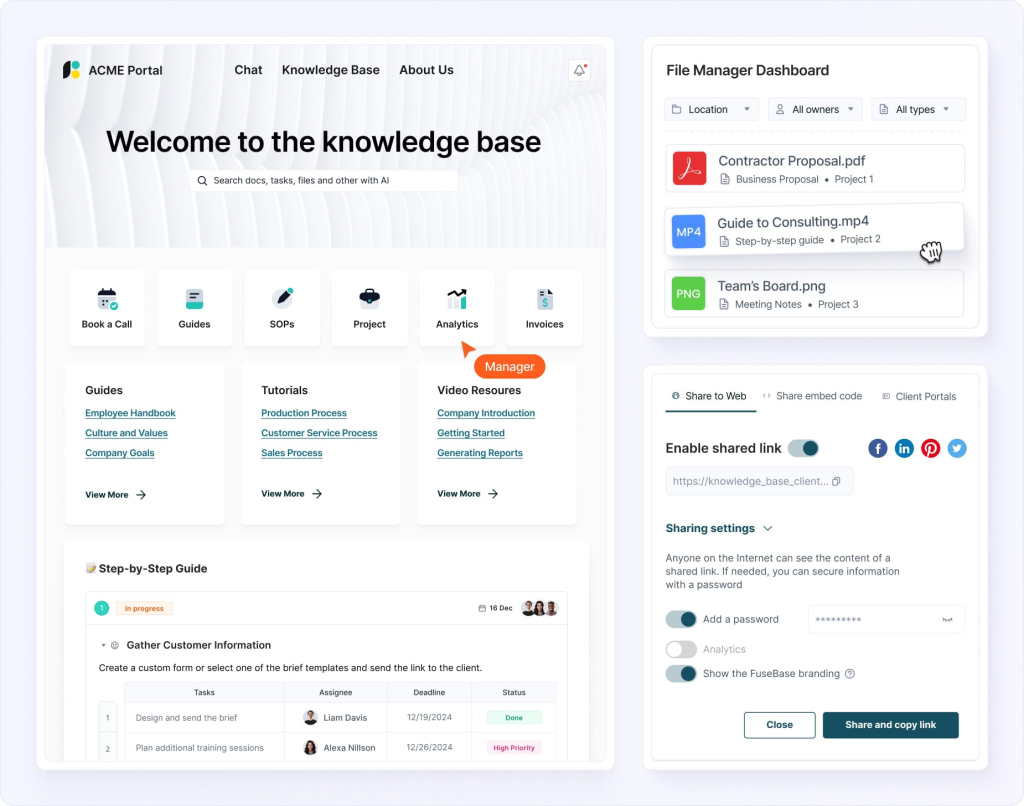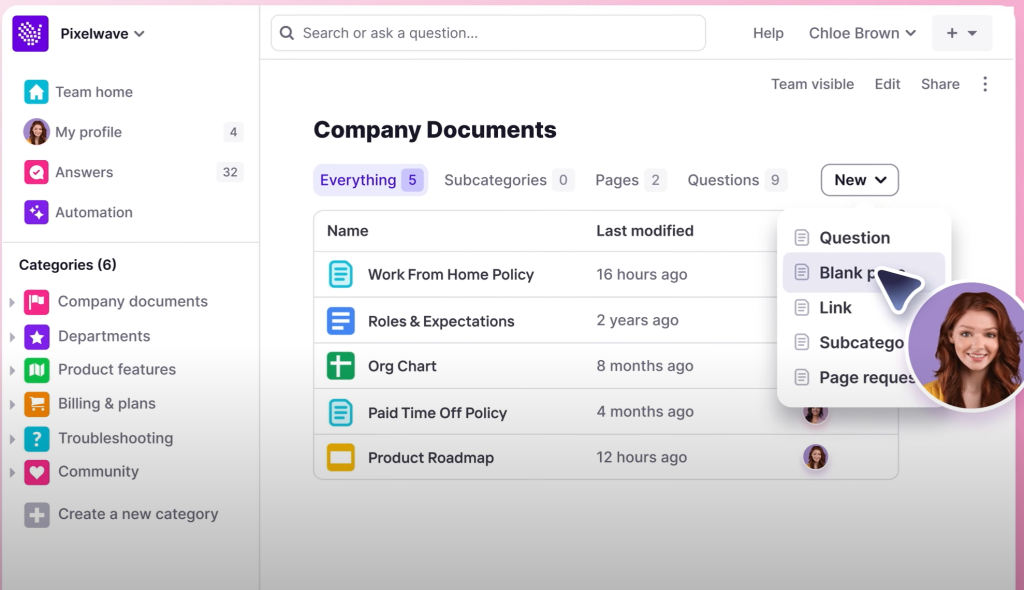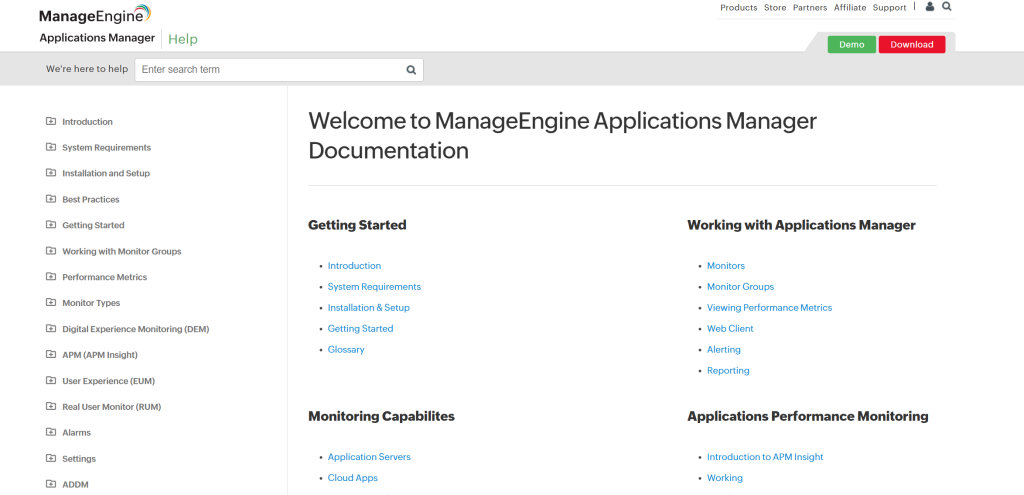
Knowledge base software provides a centralized platform for organizing, storing, and accessing both internal and external knowledge. This article will explore the features, advantages, and top solutions available in 2025 for developing a customer-facing knowledge base that promotes efficient knowledge management.
TL;DR – Best Knowledge Base Software
- FuseBase – Best for AI-powered Knowledge Bases & Branded Help Centers
- Slab – Best for Clean, SEO-Friendly Content Hubs
- Tettra – Best for Lightweight, Team-Sourced Knowledge
- Zoho Desk – Best for Support-Centric Knowledge Integration
- ProProfs Knowledge Base – Best for Quick Setup & Simple FAQs
What is Knowledge Base Software?
Knowledge base software is a specialized tool designed to facilitate the storage, organization, and retrieval of information related to a product or service. It serves as a single source of truth, enabling users to find relevant knowledge quickly and effectively. These platforms help create a knowledge base that can encompass various types of knowledge, including FAQs, troubleshooting guides, and how-to articles. By implementing knowledge management solutions, organizations can improve collaboration and knowledge sharing among users, ultimately enhancing the customer experience.
Moreover, the right knowledge base software empowers teams to document and categorize knowledge effectively. This allows businesses to maintain an organized repository that can be easily updated as new information emerges. A well-structured knowledge base not only benefits customers but also serves as an invaluable resource for internal teams, supporting their efforts in providing top-notch customer service. Ultimately, effective knowledge base software is crucial in fostering an environment of continuous learning and information accessibility.
Knowledge Base Software vs. Database
While it may seem that knowledge base software and traditional databases are similar, they serve distinct purposes in knowledge management. A database primarily focuses on storing data in a structured format, allowing for efficient data retrieval and management. In contrast, knowledge base software is designed specifically for knowledge sharing and collaboration, providing tools to create knowledge base articles and enhance user engagement. The benefits of knowledge base software extend beyond mere data storage; they enable users to find solutions to their queries quickly and intuitively.
Furthermore, knowledge base software typically includes features such as advanced search capabilities, user-friendly interfaces, and integration with collaboration tools. These features make it easier to create an effective knowledge base that can serve both internal and external users. On the other hand, databases require more technical expertise to manage and may not offer the same level of accessibility or user-friendliness. Overall, understanding the differences between these two types of systems is crucial for organizations seeking to implement effective knowledge management solutions.
Step-by-Step Guide to Choosing the Best Knowledge Base Software
Step 1: Analyze Current Challenges
Identify the specific challenges your organization faces with knowledge management. This could include issues like difficulty in finding information, lack of consistent documentation, or inefficient knowledge sharing.
Step 2: Determine the Type of Use
Decide whether you need an internal knowledge base for your team or a customer-facing knowledge base. Internal knowledge bases focus on employee collaboration, while customer-facing ones aim to enhance customer support.
Step 3: Assess Specific Requirements
List the features that are crucial for your organization. Consider robust search functionality, customizable templates, and analytics tools to track user engagement.
Step 4: Evaluate Integration Needs
Check if the knowledge base software can integrate seamlessly with your existing collaboration tools and other platforms to ensure smooth workflow and data consistency.
Step 5: Consider Scalability
Ensure the software can grow with your organization. It should handle increasing volumes of knowledge and users without compromising performance or usability.
Step 6: Explore Vendor Support and Resources
Investigate the support and resources provided by the software vendor. Access to training materials and customer support can significantly enhance your experience.
Step 7: Align with Organizational Goals
Ensure the chosen knowledge base solution aligns with your organization’s goals and contributes to improving overall efficiency.
Top Knowledge Base Software Solutions for 2025
FuseBase

FuseBase stands out as an innovative knowledge base software solution that excels in creating external knowledge bases. Its user-friendly interface enables organizations to quickly create white-label client portals and knowledge bases. With robust features such as advanced search functionality, customizable layouts, and collaboration tools, FuseBase allows teams to share knowledge effectively. Additionally, its analytics capabilities provide valuable insights into user engagement, helping organizations refine their knowledge management strategies over time.
Furthermore, FuseBase supports seamless integration with other platforms, ensuring that users can access relevant information without any friction. By utilizing FuseBase, businesses can empower customers to find answers independently, reducing the burden on customer service teams. This not only improves customer satisfaction but also fosters a culture of continuous learning and knowledge sharing within organizations. As the demand for effective knowledge management solutions continues to grow, FuseBase will be a leading choice for external knowledge base needs in 2025.
Slab

Slab has emerged as a powerful knowledge base software solution that focuses on enhancing collaboration and knowledge sharing among teams. Its clean and intuitive design allows users to create and organize knowledge base articles effortlessly, making it an ideal choice for both internal and external knowledge bases. Slab also incorporates features such as real-time editing, commenting, and integration with popular collaboration tools, empowering teams to work together more effectively. These features promote a culture of knowledge sharing, which is essential for organizations seeking to improve their knowledge management practices.
Slab’s robust search functionality ensures that users can quickly find the information they need, reducing the time spent searching for answers. The platform also supports multimedia content, allowing organizations to create rich and engaging knowledge base articles that cater to various learning styles.
Tettra

Tettra is another leading knowledge base software solution that emphasizes simplicity and user experience. Designed to help teams create and maintain a centralized knowledge base, Tettra allows users to document processes, policies, and FAQs easily. Its unique approach combines knowledge management with team collaboration, making it an ideal choice for organizations looking to foster a culture of knowledge sharing. Tettra’s integration with popular communication tools enhances its usability, enabling seamless information flow within teams.
Additionally, Tettra offers analytics tools that provide valuable insights into user engagement, helping organizations to optimize their knowledge management strategies.
Zoho Desk

Zoho Desk is a comprehensive customer service platform that includes powerful knowledge base software capabilities. It enables organizations to create a customer service knowledge base that provides users with instant access to relevant information. Zoho Desk’s intuitive interface allows teams to develop and manage knowledge base articles efficiently, ensuring that customers can find the answers they need quickly. With features like advanced search, categorization, and automated suggestions, Zoho Desk enhances the overall user experience.
Additionally, Zoho Desk integrates seamlessly with other Zoho products and popular third-party applications, providing a cohesive solution for managing customer interactions. Its analytics features allow organizations to track user engagement and identify areas for improvement in their knowledge base.
ProProfs Knowledge Base

ProProfs Knowledge Base is an intuitive platform that simplifies the process of creating and managing a knowledge base. Designed for both internal and external use, ProProfs allows organizations to develop comprehensive knowledge base articles that cater to various user needs. Its user-friendly interface and customizable templates make it easy for teams to create a knowledge base that reflects their brand identity while ensuring information is easily accessible.
Moreover, ProProfs Knowledge Base features robust search functionality, enabling users to find relevant information quickly and easily. The platform’s analytics capabilities provide insights into user behavior, allowing organizations to refine their knowledge management strategies over time.
Wrap-up
Remember, investing in the best knowledge base software will be a critical step toward achieving long-term success and customer loyalty. Choosing the right knowledge base software is critical for organizations looking to improve customer support and streamline internal processes. With many options available, organizations need to consider their specific needs and objectives when choosing a solution. The top knowledge base software solutions for 2025, including FuseBase, Slab, Tettra and others, each offer unique features and benefits that address different knowledge management needs. By using these tools, organizations can create effective knowledge bases that enable users to find information quickly, foster collaboration and improve overall customer satisfaction.